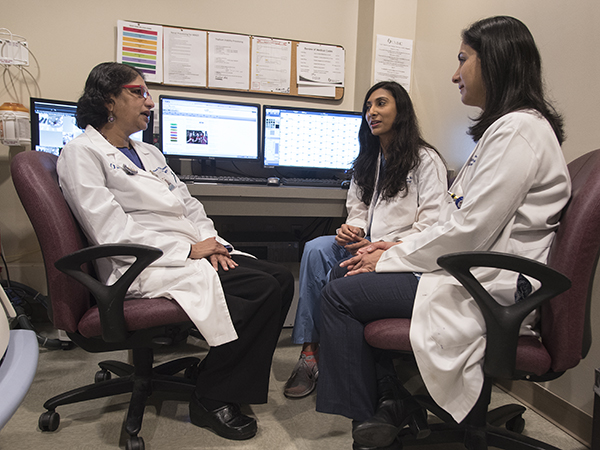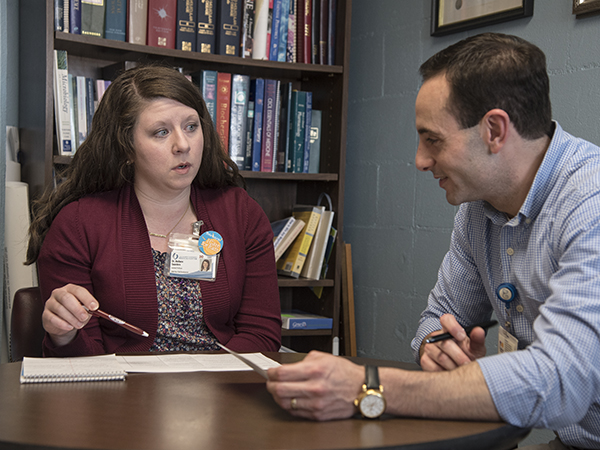Mentors aid in career advancement, networking opportunities

When she completed residencies at the Cleveland Clinic and Chicago's Michael Reese Hospital and Medical Center, Dr. Vani Vijayakumar didn't have a mentor.
She wishes someone had been there to teach her how to network, show her the ropes culturally, and tell her the steps she needed to take to advance in her career.
Vijayakumar, who goes by “Dr. Vani,” is professor of radiology at the University of Mississippi Medical Center. She came to the United States 36 years ago from India after graduation from Sri Venkateswara Medical College in Tirupati, Andhra Pradesh. “As a resident and junior faculty member, I didn't know that you needed a mentor. We did not have mentoring programs at the time,” she said.
“I wanted that for my junior faculty here so that they can become more advanced in their careers through some guidance,” said Dr. Vani, on the Medical Center faculty since 2007.
Over the past two years, she's been growing a program to mentor women students, faculty, residents and fellows and to encourage diversity through her presidency of UMMC's chapter of the Association of American Medical Colleges (AAMC) and the Group on Women in Medicine and Science.
Dr. Vani said she decided to formally begin mentoring young women after being chosen as mentor herself for a program guided by Dr. Omar Rahman, professor of pediatrics and neurology and vice chair of faculty development for the Department of Pediatrics. “Before that, I'd been mentoring residents and other people on my own,” she said.

The pediatric mentoring program for men and women was borne out of a large recruitment class four or five years ago shepherded by Dr. Rick Barr, Suzan B. Thames professor and chair of pediatrics, Rahman said. “We had way too few specialists, and we recognized that you can't just invest in recruitment. You have to invest in retention,” said Rahman, who also serves as chief of the Division of Medical Genetics.
“You don't want to get them here, and then just expect them to figure out how the world of academics works,” Rahman said. “I remember when I came here many years ago, I was given an office and a clinic schedule and told to go.”
He said Dr. Vani was invited to be a pediatrics mentor because it's wise to go outside a mentee's division to find people who will be truly objective. “We asked Vani to mentor someone who interacts with her division, but is not in her division,” Rahman said.
The mentor-mentee marriage worked beautifully, he said. “We were impressed with how seriously Vani took the responsibility,” he said. “The mentee raved to me and said how happy she was to have someone like her.”
Dr. Vani encourages diversity among women faculty, and knows what it feels like to navigate the academic and medical system when you're from a different ethnic or religious background.
Mentoring, she said, is vital to professional development in the field of medicine. It can influence career choices and faculty retention, and it can set into motion junior faculty being engaged in research and teaching.
On a more personal level, Dr. Vani said, mentoring programs provide an emotionally supportive and encouraging environment and can help women balance an academic and medical career with the rigors of family life and raising children.
“You exchange personal ideas and beliefs,” she said. “Networking is very big in mentoring, and you can help your mentee get to know a lot more people, and not just at UMMC. You can help them learn skills from other people that they interact with, both at UMMC and nationally.”
A good mentor is accessible to their mentee, dedicated to helping the mentee set and achieve goals, is compatible with the mentee in practice style, vision and personality, and is good at identifying the mentee's strengths.
Dr. Simeen Pasha, assistant professor of pediatric endocrinology, appreciates those qualities in Dr. Vani, who began mentoring her in 2013.
“She was absolutely wonderful,” Pasha said. “It's been every step of the way over the last three or four years. She's made sure I check the boxes necessary for me to move forward to be promoted, and to academically advance in my career and meet my clinical requirements. That's something that every junior faculty member struggles with.”
Recently, she said, Dr. Vani invited her to a nuclear medicine meeting “where we put together an abstract that talked about recent guidelines for pediatric cancers. We put a summary of that together.”
Dr. Vani looks out for her when it comes to balancing work and being a mom, Pasha said. “Having a woman mentor who understands this and can help guide you on how to best balance the juggling act means a lot,” she said. “Numerous times, I've gone to her office about what was going on in my life right now, and what all I had to do. She got it.”
Dr. Nisha Swaminathan met Dr. Vani when she was a resident. “I was interested in radiology. I talked to her, and she asked me to help her with a project. The project involved the program director of radiology, and it helped me in getting my foot in the door,” Swaminathan said.
The project: “There are a lot of seizure patients who may require brain surgery,” Swaminathan said. “We combined nuclear studies with brain MRIs to show us a region that is active. That could be the seizure focus. The MRI shows if there is structural damage in that area. It helps the surgeon focus on that particular region or spot.”
She went on to present the project with Dr. Vani at gatherings in Florida and locally, Swaminathan said. “It was a great opportunity that she gave me, and it helped me with my applications. Now, I'm a third-year radiology resident.”

Dr. Robert Brodell, professor and chairman of the Department of Dermatology, mentors all of his junior faculty. He also works to ensure they have the information they need to grow in academia. “People don't understand the importance of promotion and tenure until it directly involves them,” he said.
He encourages each of them to build an “educators' portfolio” so that they can chronicle all of their progress and achievements, from giving lectures to themselves being a mentor. And, Brodell gives each frank, one-on-one attention.
“Every mentor serves a number of masters,” Brodell said. “We need to do what is best for our university, our department, and even organizations where we have a leadership role. When I am wearing my mentor hat, I am completely open about potential conflicts, and my effort is focused on what is best for the mentee.”
Mentoring, Rahman said, “is rejuvenating for people who have been here a while - that they can have an impact with a new generation coming in. It's key that they know the institution really cares about them.”
Dr. Vani wants to hear from women residents and junior faculty who would like to be mentored. She's especially promoting it before her term expires in the local AAMC chapter. She'd like to develop a mentorship curriculum with Rahman and Brodell.
Although she's had other mentors, Swaminathan said, “that doesn't stop me from going over and talking to Dr. Vani. She just gave me another opportunity to speak at a nuclear medicine symposium. This helps me put myself out there. If you don't do that, you don't know what your limits are.”
Said Pasha: “She's been so supportive through this whole journey. I'm indebted to her.”


